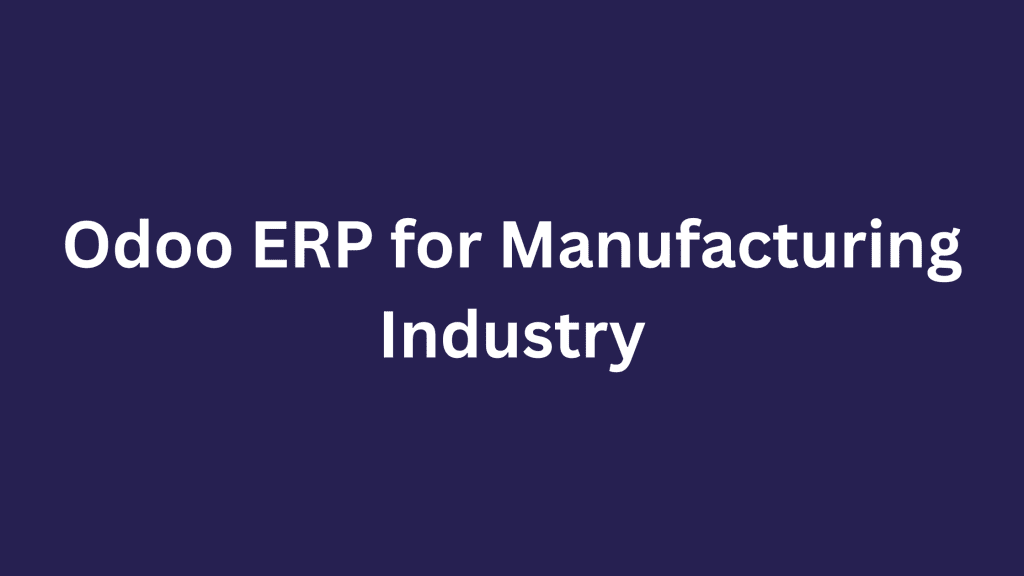Managing a manufacturing business is more than ensuring effective production lines in today’s market scenario. You want end-to-end visibility into your operations, from sourcing raw materials to inventory management, production scheduling, and quality control. This is exactly where Odoo ERP for manufacturing industry plays a prominent role. With this one tool, you’ll have a solution that integrates different processes that can help you leverage your resources, minimize waste, and maximize efficiency.
With its ability to integrate all aspects of your manufacturing operations into a single, cohesive system, Odoo ERP allows you to make data-driven decisions, optimize workflows, and ensure that you are positioned to meet market demand. An ERP platform can be a reason to minimize complicated operations while keeping up with a high-quality product and a low cost by simplifying processes. Let’s dive in to discuss more about this!
Table of Content
- 1 Challenges in Manufacturing Industry
- 1.1 1. Complex Production Planning
- 1.2 2. Inventory Management Issues
- 1.3 3. Quality Control Difficulties
- 1.4 4. Equipment Maintenance Challenges
- 1.5 5. Data Silos and Lack of Integration
- 1.6 6. Regulatory Compliance
- 1.7 7. Workforce Management
- 1.8 8. Evolution of Customer Expectations
- 1.9 9. Environmental Compliance
- 1.10 10. Lack of Accurate Forecasting
- 1.11 11. Disconnected Customer and Vendor Management
- 1.12 12. Rising Operational Costs
- 2 Features of Odoo ERP for Manufacturing Industry
- 2.1 1. Material Requirements Planning
- 2.2 2. Bill of Materials (BOM) Management
- 2.3 3. Work Order and Routing Management
- 2.4 4. Stock and Stockroom Control
- 2.5 5. Quality Management
- 2.6 6. Maintenance Management
- 2.7 7. Product Lifecycle Management
- 2.8 8. Real-Time Logging and Dashboard
- 2.9 9. Integration with Other Modules
- 2.10 10. Compatibility with IoT and Automation
- 2.11 11. Cost Tracking and Analytics
- 2.12 12. Mobile Accessibility
- 2.13 13. Role-Based Access and User Management
- 2.14 14. Custom Alerts and Notifications
- 2.15 15. Multi-Company and Multi-Language Support
- 3 Benefits of Odoo ERP for Manufacturing Industry
- 4 Why to Choose iVenture Team to Develop Odoo ERP for Manufacturing Industry
Challenges in Manufacturing Industry
Running a manufacturing company comes with its own set of challenges, which, if not addressed, can affect growth and profitability:
1. Complex Production Planning
Without a centralized system, coordinating multiple production lines, managing work orders, and ensuring timely delivery can be daunting. Inefficient and out-of-sync processes disrupt workflow and lead to costly delays. You’re probably also dealing with challenges such as a lack of real-time visibility and inconsistent production schedules.
2. Inventory Management Issues
It is critical to maintain optimal inventory levels. Overstocking ties up working capital, whereas understocking may bring production to a halt. Traditional tracking methods often lead to mistakes, resulting in stock imbalances and production delays. An unreliable Odoo manufacturing ERP system will force you to depend on guesswork or outdated spreadsheets.
3. Quality Control Difficulties
Constant supervision is necessary for maintaining the quality of the product. Without standardized quality checks, it’s easy for defects to slip through the cracks, leading to customer dissatisfaction and potential recalls. Give quality assurance as a part of your process. This is where Odoo helps you.
4. Equipment Maintenance Challenges
Unscheduled equipment downtime will interfere with production schedules. Without an active maintenance plan, machine breakdowns can cause serious losses. Odoo allows you to plan maintenance tasks, minimizing interruption and prolonging the life cycle of your facilities.
5. Data Silos and Lack of Integration
When departments work in silos, data gets scattered. Without integration, decision-making becomes difficult, and the response time to market changes slows. Odoo combines all this data, so all your departments work from the same source.
6. Regulatory Compliance
Complying with industry rules or standards is mandatory. Indeed, compliance is a matter of complexity and risk without proper documentation and traceability. Odoo gives you a transparent audit trail for every product and process.
7. Workforce Management
One area that is often underestimated in manufacturing is workforce planning. These could be assigning tasks, tracking productivity, and managing shift rotations; these take place on a system that provides real-time insights. For instance, Odoo’s human resources modules integrate well with all the production modules, making workflows more seamless.
8. Evolution of Customer Expectations
Manufacturers must become more agile as customers ask for more customization and faster turnaround times. A normal ERP system would leave much of the demand unmet due to the dynamic nature of the business and how its needs change, and Odoo, your adaptive ERP solution, can help with the meeting without any glitches.
9. Environmental Compliance
In the case of sustainability, complying with environmental laws and reducing carbon footprints is now a necessity. To improve Odoo’s contribution in this area, customizable reports can easily be set up to track energy usage, emissions, and sustainability metrics.
10. Lack of Accurate Forecasting
Forecasting accurately is one of the most important components of aligning production with market demand. Forecasting based on inaccurate data or relying on outdated reports results in excess inventory or missed sales. Odoo’s data analytics and AI-based forecasting tools help you foresee customers’ wants and shape your operations accordingly.
11. Disconnected Customer and Vendor Management
People from various departments are involved in managing customer relationships and vendor performance. Odoo consolidates this data so you can view details about a customer’s history, preferences, and vendor reliability. This helps expedite the procurement process, improving client satisfaction.
12. Rising Operational Costs
Raw materials, logistics, and labor are increasing manufacturers’ costs. If not, it’s difficult to spend your money correctly. Odoo’s powerful cost-tracking features enable you to identify high-cost areas within your company, allowing you to implement cost-cutting strategies efficiently.
Features of Odoo ERP for Manufacturing Industry
Odoo manufacturing ERP provides the following set of tools to tackle these issues.
1. Material Requirements Planning
You can plan manufacturing based on demand forecast with Odoo’s MRP module, ensuring materials are available on time. This reduces waste and maximizes resource use.
2. Bill of Materials (BOM) Management
You can easily create and manage multi-level BOMs. Start by defining components, maintaining operations, and managing work centers through Odoo for production with a clear roadmap. You can also set up alternate BOMs or configurable product variants.
3. Work Order and Routing Management
Create work orders and arrange routing paths for your products. This ensures that every step in the production is executed chronologically, maximizing the workflow. From the dashboard, you can monitor each order’s real-time progress.
4. Stock and Stockroom Control
Monitor inventory levels in real-time across multiple warehouses with batch and serial number tracking. The batch and serial number tracking capabilities of the Odoo inventory module enable you to control the visibility of your stock, maintaining precise stock levels. Other features include barcode scanning, FIFO and LIFO guidelines, and warehouse automation.
5. Quality Management
In the first step, you ensure the component’s quality immediately after production. With Odoo, you can define inspections, follow up on nonconformities, and launch corrective actions in real time. The system can quickly raise quality alerts and maintenance requests when anomalies are detected.
6. Maintenance Management
Plan maintenance work to reduce machine downtime, keep track of the machine’s performance, and schedule maintenance using the Odoo maintenance module. You can log equipment issues in the field and instantly assign technicians.
7. Product Lifecycle Management
Seamlessly manage engineering changes and document revisions. The PLM module in Odoo collaborates with big engineering and production teams to synchronize product designs. This decreases miscommunication errors tremendously.
8. Real-Time Logging and Dashboard
Customizable dashboards and reports provide insights into your operations. Utilize KPI analysis for data-driven decisions and recognizing and improving opportunities. Reporting can be automated and set for delivery to stakeholders.
9. Integration with Other Modules
The modular architecture of Odoo can easily integrate with other business functions like sales, purchases, accounts, human resources, etc., giving you an integrated view of your business.
10. Compatibility with IoT and Automation
Odoo is IoT-capable, meaning you can collect data from your machines. This, in turn, translates into immediate feedback and a more efficient shop floor. Automation reduces manual interventions and enhances the throughput.
11. Cost Tracking and Analytics
Odoo enables you to track cost trends per production cycle, from raw materials to labor to overheads. This transparency helps you spot cost-saving opportunities and ensures effective budget management.
12. Mobile Accessibility
Odoo offers mobile-friendly interfaces, allowing shop floor managers and operators to, for example, log in from their devices to view real-time data, scan barcodes, approve orders, or report maintenance issues.
13. Role-Based Access and User Management
Odoo also lets you limit access to specific users through user roles, Odoo modules, and data access controls. This provides access to maintain sensitive data and is sensitive to issues of proprietary or inaccessible information.
14. Custom Alerts and Notifications
Get notified with custom alerts for low inventories, pending approvals, equipment breakdowns, and more. Such notifications encourage you to act quickly to combat problems before they become more serious.
15. Multi-Company and Multi-Language Support
Moreover, if you have businesses in different regions, Odoo provides multi-company and multi-lingual features to manage operations in multiple areas, all in your preferred language.
Benefits of Odoo ERP for Manufacturing Industry
There are a lot of benefits to implementing Odoo Manufacturing ERP software for your manufacturing business:
Improved Operational Efficiency
Odoo streamlines workflows and automates repetitive tasks, minimizing manual errors and speeding up production cycles, ultimately improving efficiency.
Improved Inventory Control
With real-time inventory tracking, the system can keep track of stock levels to minimize carrying costs while avoiding stockouts that cause production delays.
Reduced Downtime
One of those strategies is to schedule maintenance across all necessary equipment before it breaks down unexpectedly.
Scalability and Flexibility
The modular nature of Odoo means you can add more and more areas of functionality over time without disrupting what already exists.
Cost Savings
Whereas by increasing the utilization of resources, cutting waste, and streamlining processes, Odoo leads to enormous cost savings in your entire manufacturing operations.
Compliance and Traceability
Odoo’s built-in documentation and traceability features help you easily meet industry rules, reducing the chances of incurring penalties or legal issues.
Why to Choose iVenture Team to Develop Odoo ERP for Manufacturing Industry
iVenture Team is leading Odoo development company, offering Odoo implementation services to manufacturing industry. We have team of expert who can integrate the require modules and customize according your business need.
Conclusion
In the ever-evolving realm of manufacturing, the difference between a thriving operation and a struggling one often lies in the integration of comprehensive resource planning systems. Odoo ERP software for manufacturing industry provides a strong solution to these hurdles. Odoo ERP helps streamline operations, maintain quality standards, and enable sustainable growth by bringing different aspects of your operations under one roof. You will be guided through how Odoo can bring your manufacturing processes together to enhance your bottom line while also being responsive to the market. If you’re seeking an all-in-one solution, Odoo ERP is your choice!
Related Post:








